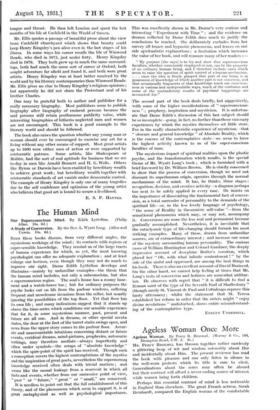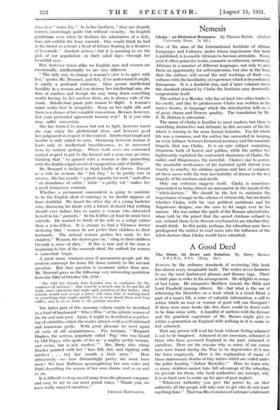Ageless Woman Once More
Ma. PERCY BROEMEL has thrown together rather carelessly a glittering heap of wit and wisdom ostensibly about Her and incidentally about Him. The present reviewer has read the book with pleasure and can only listen in silence to the well-worn protests which its title is sure to elicit. Generalizations about the sexes may often be absurd but their contrast will afford a never-ending source of interest while women bring forth children.
Perhaps this essential contrast of mind is less noticeable in England than elsewhere. The great French actress, Sarah Bernhardt, compared the English woman of the comfortable class to a " water-lily." As to her brothers, "they are elegant, correct, exceedingly polite but without vivacity. An English gentleman even when he declares his admiration of a lady, does not exhibit the least warmth. One would think he had in his breast as a heart a head of lettuce floating in a decanter of lemonade." Insolent actress ! but it is amusing to see the pick of our population—in their salad days—through her beautiful eyes.
But, however much alike we English men and women are emotionally, intellectually we are very different.
"The only way to change a woman's view is to agree with her," quotes Mr. Broemel, and this, if we understand it aright, is surely a profound criticism. Once arouse intellectual hostility in a woman and you destroy her intellectual aim, she fires at random and though she may bring down something worth having by her random shots, she is always wide of the mark. Intellectual panic puts reason to flight. A woman's mind works best in sympathy. Keep on her right side and there is a chance of her complete conversion. Beware, however, Jest your pretended agreement become real ! It is you who may suffer conversion.
She has learned to reason but not to fight, however much she may enjoy the gladiatorial show, and however good her judgement in respect of the contest. Intellectual rough and tumble is only suited to men. Occurring between women it leads only to intellectual breathlessness, to be recovered from by mutual apology. Where both sexes are concerned mutual respect is put to the hazard and a man may go away thinking that "to quarrel with a woman is like quarrelling with the double-edged sword of exasperation and of futility."
Mr. Broemel is inclined to think kindly of shrews. Except as a wife he reckons the fair fury" to be pretty sure of success. She has usually" a great capacity for work "and often "an abundance of virtue" while "a pretty wit" makes her a good temporary comrade.
Whether a permanent camaraderie is going to continue to be the English ideal of marriage is, we should suppose, at least doubtful. We heard the other day of a young bachelor who, discussing his ideals with a friend, declared that nothing should ever induce him to marry a woman who interested herself in his " pursuits." In his hobbies at least he must have solitude. He wanted to think of his wife as a refuge rather than a yoke-fellow. It is strange to find a Viennese doctor declaring that women do not prefer their children to their husbands. The normal woman prefers her mate to her children." Women, the doctor goes on, "cling to their children through a sense of duty." If this is true and if the man is beginning to tire of the comrade ideal, the outlook for women is somewhat tragic.
A great many common-sense if unromantic people put the modern contempt for home life down entirely to the servant question. But that question is recurrent rather than new.
Mr. Broemel gives us the following very interesting quotation from the Idler of October 7th, 1758:
"She told her friends that London was in confusion by the insolence of servants : that scarcely a wench was to be got for all work, since education had made such numbers of fine ladies ; that nobody would now accept a lower title than that of waiting-maid Or something that might qualify her to wear laced shoes and long ruffles, and to sit at work in the parlour window."
The latter part of this amusing volume might be described as a kind of haphazard " Who's Who" of the artistic women of the far and near past. Again, it might be described as a gather- ing of celebrities which the reader attends with a well-informed and humorous guide. With great pleasure we meet again all sorts of old acquaintances. For instance, Margaret Hughes, the actress, popularly called 'Peg,' who was kissed by Old Pepys, who spoke of her as 'a mighty pretty woman, WO seems, but is not, modest.'" Mrs. Barry also, whom Kneller painted with her "face full, fair, and rippling with intellect . . . but her mouth a little awry." How attractively—no—how distractingly pretty she must have been ! We hear Malibran apostrophizing her own voice and Patti describing the reason of her own charm, and so on and so on.
It is difficult to drag oneself away from the pleasant company and easy to say in our most genial tones, "Thank you, we have really enjoyed ourselves."
CECILIA TOWNSEND.































 Previous page
Previous page